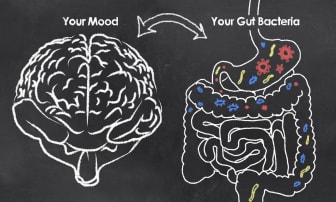This is mental health awareness month and mental health is trending for 2021. OU Kosher certifies products that can help in this area like Norman’s Greek Yogurt Creamy Blends – Vanilla Lavender, a soothing probiotic that can produce good bacteria in the gut which is important for the brain as well, as the gut produces 95% of serotonin that’s used by the brain to control emotions relating to mood.
There’s no question anymore that there is a relationship between what we eat to how we feel. The gastrological system or “gut” and the brain are profoundly interlinked and work together to control our mental stability. Nutritional psychiatry is a medically established phenomenon, and as Eva Selhub, MD, who is on staff at Harvard Medical School and an international expert in this area, points out in her blog, “Put simply, what you eat directly affects the structure and function of your brain, and, ultimately, your mood.”
Dr. Drew Ramsey, an author and psychiatrist who founded the Brain Food Clinic in New York City to treat depression, anxiety and emotional concerns, in a Ted Talk, introduces “Mental Health 2.0.” He challenges every person to build their mental health just as their physical health. He asks, “what can you do every day” [to improve]? He notes that if we put the right food in our body, we can have “a growing and vibrant mind.”
The Makeup of the Brain
If we understand the makeup of the brain, we can have a greater understanding of the kinds of food that it needs to thrive. Most of the brain’s weight consists of fat. The remaining brain matter consists of proteins, amino acids, traces of micronutrients and glucose. In sum, the proper fatty acids and proteins are key to the expansion of the mind. This is why eating nuts, seeds and fatty fish are crucial.
The Gut
The gut, also known as the “second brain,” regulates much of the digestion process, though it does receive cues from the brain on how to anticipate and follow through on certain processes. The gut produces 95% of the body’s serotonin, a key neurotransmitter responsible for mood. It’s also composed of 100 trillion microorganisms or bacteria that form the gut microbe. These bacteria process the food and determine gut vitality.
The Connection between the Brain and the Gut
The brain and gut are connected by the vagus nerve. This provides the passageways for the neurotransmitters to travel back and forth between them. Serotonin passes to the brain which absorbs it and becomes the epicenter of our mood. The gastrological and brain connection also explains other stresses we feel. If we’re depressed, we can experience upset stomachs or irregular bowel movements and conversely if the bacteria in the gut is inflamed or not working homogeneously with each other then the mind can experience lows and anxieties.
What to Avoid to Ensure a Healthy Connection Between the Gut and the Brain
The fundamental way to ensure that the gut and brain are working harmoniously together is through proper nutrition. For example, excess sugars and trans fats make the gut work harder to process the food which can cause inflammation and instability in that area. This has a direct effect on the brain, for then the brain can’t work in proper fashion. Also, poor nutrition can affect the serotonin as the gut produces it. Though it’s true that food with antioxidants can fight cell inflammation, there’s no reason to cause it in the first place.
What Diet to Adopt to Build a Strong Gut-Brain Connection
Researchers have found that the Mediterranean diet maintains good gut microbiome health. Adhering to this diet includes eating plant-based foods like fruits, vegetables, grains, legumes and nuts which are all full of fiber, vitamins, minerals, and antioxidants. Equally as important is eating fish, such as salmon, and olive oil as they provide omega-3 and omega-6 fatty acids which the body can’t produce, but can only come through diet. Omega-3 and omega-6 fatty acids are important for robust brain function. Meat and dairy intake should be reduced as they can alter gut bacteria. Drinking two cups of green tea a day is especially important as it enables smooth digestion in the gut area and has benefits for the mind as it contains polyphenols that improve brain cognition and due to its low caffeine content, one gets a boost but without the side effects of consuming too much caffeine. Prebiotic foods are important for the gut as they nourish the bacteria. Examples of prebiotics are onions, garlic, leek, soybeans, chicory root, honey, bananas and Jerusalem artichoke. Probiotic foods like yogurt help increase the gut bacteria and are thus beneficial to the microbiome. Other examples of probiotics include cottage cheese, cheddar cheese, sauerkraut and kombucha.
A Healthy Brain-Gut Recipe for Shavuot, Courtesy of Kosher.com:
Mediterranean Fish Board
By: Adina Schlass
Ingredients (16)
Start with your main components
- Tuscanini Tuna
- Sardines
- Gravlax
- Cured salmon
- Caviar
Fill up the board with accompaniments
- Olives
- Gherkins
- Cherry tomatoes
- Thinly sliced cucumbers
- Thinly sliced radishes
- Thinly sliced daikon
- Arugula or mixed greens
- Sliced crusty baguette
- Tuscanini Parchment Crackers
- Whole grain crackers
- Fresh lemon slices
Instructions
Start with a large flat board or serving tray. Place down your bowls of fish, jars of tuna and cavier.
Next, place down some arugula or mix greens and lay your salmon and sliced gravlax on top.
Once you have your main components laid out, fill in the empty spaces with sliced cucumbers, radishes, and a variety of crackers. Garnish with fresh lemons.




